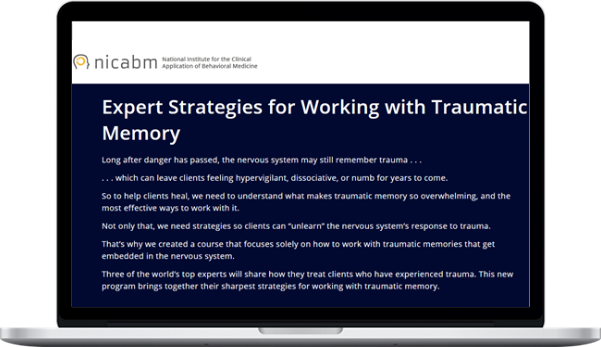NICABM – Working with Traumatic Memory
$197.00 $29.97
Total Sold: 1
Instant Delivery
Description
NICABM – Working with Traumatic Memory
Expert Strategies for Working with Traumatic Memory
Long after danger has passed, the nervous system may still remember trauma . . .
. . . which can leave clients feeling hypervigilant, dissociative, or numb for years to come.
So to help clients heal, we need to understand what makes traumatic memory so overwhelming, and the most effective ways to work with it.
Not only that, we need strategies so clients can “unlearn” the nervous system’s response to trauma.
That’s why we created a course that focuses solely on how to work with traumatic memories that get embedded in the nervous system.
Three of the world’s top experts will share how they treat clients who have experienced trauma. This new program brings together their sharpest strategies for working with traumatic memory.
Expert Strategies for Working with Traumatic Memory
How Trauma Affects the Four Types of Memory
Peter Levine, PhD Bessel van der Kolk, MD
- The Core Problem with Focusing on a Client’s Traumatic History
- How Trauma Disrupts a Client’s Ability to Make Meaning from an Experience
- The Specific Type of Memory That Trauma Can Shut Down (That Robs Our Clients of a Sense of Purpose and Direction)
How the Nervous System Gets Tricked into Thinking Trauma Is Happening in the Present
Bessel van der Kolk, MD Peter Levine, PhD
- How to Avoid Triggering a Client’s Reactive or Protective Response When Working with Trauma
- The One Key Factor That Can Make Traumatic Memory Overwhelming (and How to Work with It)
- How Trauma Derails the Time-Keeping Part of the Brain (and One Way to Bring It Back)
- What Can Go Wrong When We’re Helping a Client Come Out of a Dissociated State
How Trauma Can Affect Procedural Memory and Create Maladaptive Patterns
Bessel van der Kolk, MD Pat Ogden, PhD Peter Levine, PhD
- How to Release Procedural Memory That Gets Corrupted and Reestablished as Painful Physical Patterns
- Why Procedural Memories Can Be Challenging for Our Clients to Work With
- What to Do When There’s a Procedural Pattern in a Client’s Thoughts
What Can Happen When a Procedural Memory Becomes “Stuck”
Peter Levine, PhD Pat Ogden, PhD
- Two Ways to Approach Procedural Memory That Gets Expressed Through the Body
- Case Study: Working with a Symptom When There’s No Memory of Trauma
- How to Work with Traumatic Memory That Forms at a Preverbal Level
Four Strategies to Help Clients Tolerate and Integrate Traumatic Memory
Pat Ogden, PhD Bessel van der Kolk, MD
- How to Help Clients “Unlearn” Their Nervous System’s Response to Trauma
- How to Build Up Inner Resources to Prevent Overstimulation and Shutdown
- How to Uncover “Survival Resources” and Transform a Traumatic Memory
- How to Help Clients Change Their Orienting Habits to Calm the Nervous System
Critical Insights on How to Work with Traumatic Memory
Ron Siegel, PsyD Ruth Lanius, MD, PhD
- How to Help Clients Learn to Differentiate Between the Past and the Present
- How to Help Clients Create a “Grounding Kit” to Soothe the Flashback Experience and Bring Them Into the Present Moment
- Case Study: When a Flashback Is a Form of Self-Punishment
Key Concrete Practices for Addressing Trauma Memories
Joan Borysenko, PhD Bill O’Hanlon, LMFT
- How to Regenerate the Hippocampus to Help Clients Repair Memory after Trauma
- Two Techniques to Help Clients Who Have Experienced Trauma Reorient to a Hopeful Future
- Making Meaning Out of Trauma: A Case Study
More courses from the same author: NICABM
Delivery Policy
When will I receive my course?
You will receive a link to download your course immediately or within 1 to 21 days. It depends on the product you buy, so please read the short description of the product carefully before making a purchase.
How is my course delivered?
We share courses through Google Drive, so once your order is complete, you'll receive an invitation to view the course in your email.
To avoid any delay in delivery, please provide a Google mail and enter your email address correctly in the Checkout Page.
In case you submit a wrong email address, please contact us to resend the course to the correct email.
How do I check status of my order?
Please log in to HealingCourse account then go to Order Page. You will find all your orders includes number, date, status and total price.
If the status is Processing: Your course is being uploaded. Please be patient and wait for us to complete your order. If your order has multiple courses and one of them has not been updated with the download link, the status of the order is also Processing.
If the status is Completed: Your course is ready for immediate download. Click "VIEW" to view details and download the course.
Where can I find my course?
Once your order is complete, a link to download the course will automatically be sent to your email.
You can also get the download link by logging into your HealingCourse account then going to Downloads Page.
Related products
Total sold: 3
Total sold: 2
Total sold: 3










